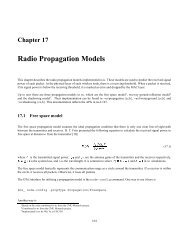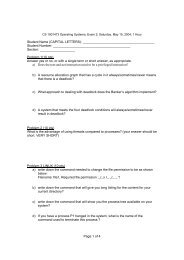Progress report - The University of Jordan
Progress report - The University of Jordan
Progress report - The University of Jordan
You also want an ePaper? Increase the reach of your titles
YUMPU automatically turns print PDFs into web optimized ePapers that Google loves.
Interim UNESCO Chairs Programme<br />
<strong>Progress</strong> <strong>report</strong><br />
Period <strong>of</strong> activity: 01/01/2004-31/12/2005<br />
Title <strong>of</strong> the UNESCO Chair or Network:<br />
UNESCO/EOLSS Chair in Wadi Hyrdology<br />
Report established by: Pr<strong>of</strong>. Muhammad. R. Shatanawi<br />
Function / Title: Chair holder<br />
Pr<strong>of</strong>essor <strong>of</strong> Water Resources<br />
<strong>University</strong> <strong>of</strong> <strong>Jordan</strong><br />
Summary<br />
Page<br />
I. Address (if modified) 2<br />
II. Available resources 3<br />
A. Human resources 3<br />
B. Material resources 3<br />
III. Activities 3<br />
A. Research 3<br />
B. Seminars 8<br />
C. Training course 8<br />
D. Conferences and Workshops 8<br />
E. Missions 9<br />
IV. Impact 10<br />
V. Forthcoming Activities 11<br />
VI.<br />
Annexes
I. Address<br />
Name:<br />
Function/Title:<br />
<strong>University</strong>/Institution:<br />
Faculty/Department/Centre:<br />
P.O.Box:<br />
Street:<br />
Postal Code:<br />
City :<br />
Province:<br />
Country:<br />
Phone :<br />
Fax:<br />
E-mail:<br />
Web Site :<br />
Address <strong>of</strong> the<br />
Host Institution<br />
<strong>University</strong> <strong>of</strong> <strong>Jordan</strong><br />
Amman<br />
<strong>Jordan</strong><br />
Address <strong>of</strong> the<br />
Chair holder<br />
(or coordinator)<br />
Pr<strong>of</strong> Muhammad Shatanawi<br />
UNESCO Chair Holder<br />
<strong>Jordan</strong> <strong>University</strong><br />
Faculty <strong>of</strong> Agriculture<br />
13042<br />
Queen Rania street<br />
11942<br />
Amman<br />
Amman<br />
<strong>Jordan</strong><br />
962 777 48 44 99 ,<br />
962-6-5355000/2580<br />
962-6-5355577<br />
shatanaw@ju.edu.jo<br />
www.ju.edu.jo,<br />
http://web.ju.edu.jo/wadihydrology<br />
2
II.<br />
Available resources<br />
Please specify for each item, when available, total cost and funding sources<br />
(for guidelines see Annex 3)<br />
A. Human resources<br />
1. For the administration <strong>of</strong> the UNESCO Chair<br />
• Pr<strong>of</strong>. M. R. Shatanawi, Chair holder <strong>of</strong> the Wadi Hydrology<br />
• Ms. Sawsan Naber, Chair administrative and information <strong>of</strong>ficer<br />
2. For the teaching/training/ research activities:<br />
• One Ph.D in hydrology, Two Ph.D. in GIS and remote sensing working on<br />
different projects <strong>of</strong> the Chair.<br />
• Five research assistants working on GIS.<br />
B. Material resources<br />
• Computers, printers, and scanners.<br />
• GIS facilities and s<strong>of</strong>tware.<br />
• Automatic Weather Station.<br />
• Field Equipment.<br />
III.<br />
Activities<br />
A. Research<br />
1. Characterization <strong>of</strong> Wadi Systems in <strong>Jordan</strong>.<br />
a. In order to characterize the Wadi system in <strong>Jordan</strong>, the different 15 surface<br />
basins have been identified with respect to area, volume <strong>of</strong> run<strong>of</strong>f, and<br />
drainage outlets. <strong>The</strong>se basins can be classified under two categories;<br />
basin that drain their water westward ending in the Dead Sea and basin<br />
that drain its water into desert Mudflat (Qa’a). Most <strong>of</strong> the water courses in<br />
these wadis are dry creeks. Attached (Annex I) a description <strong>of</strong> the Basins<br />
classified according to their drainage outlet.<br />
b. Zerqa River basin is under investigation with respect to optimization <strong>of</strong><br />
water resources under the activities <strong>of</strong> OPTIMA project which is funded by<br />
the European Commission under contract No.: 509091. <strong>The</strong> following<br />
outcomes have been achieved:<br />
• <strong>The</strong> boundary <strong>of</strong> the basin has been delineated<br />
• <strong>The</strong> basin has been subdivided into the following sub-basin: Sail Amman,<br />
Wadi Dhuliel, Jerash, Wadi Rmaimein, Wadi el-Kittih and other small<br />
wadies. Wadi Dhuliel sub-basin representing the arid land conditions will be<br />
studied in details by dividing it into third level catchments. Catchments at<br />
these level have been characterized using WMS models.<br />
• Land use maps have been prepared<br />
• Data concerning rainfall from 4 stations have been collected as well as<br />
run<strong>of</strong>f reading from Jarash gauging station.<br />
• Surface water resources, groundwater wells and wastewater treatment<br />
plants have been identified and put into GIS format.<br />
3
• Major population centers have been located and put as a layer in GIS<br />
format.<br />
• A progress <strong>report</strong> on characterization <strong>of</strong> Zarqa River basin has been<br />
prepared (Annex II).<br />
2. Sustainable Management <strong>of</strong> Scare Resources in Coasted Areas (SMART).<br />
Expected results:<br />
• Policy guidelines for the management <strong>of</strong> water resources in Aqaba.<br />
• Develop models to optimize the use <strong>of</strong> water resources.<br />
• Develop a set <strong>of</strong> social and technical indicators<br />
• Utilize hydrodynamic models to predict the effect <strong>of</strong> wind, tides and point<br />
source pollution on sea water movement.<br />
Target group:<br />
• Public administration and decision makers.<br />
• Researchers.<br />
• Funding agencies.<br />
• Aqaba Special Economic Zone Authority.<br />
Partnership:<br />
• <strong>University</strong> <strong>of</strong> <strong>Jordan</strong>, Amman, <strong>Jordan</strong><br />
• Marine Science Station, Aqaba, <strong>Jordan</strong><br />
• Aqaba Special Economic Zone Authority<br />
• Institutions from Portugal, France, Austria, Turkey, Egypt, Lebanon, <strong>Jordan</strong><br />
and Tunisia<br />
Geographic Coverage: <strong>The</strong> Coastal area <strong>of</strong> the Mediterranean.<br />
Funding Sources:<br />
<strong>The</strong> European Commission<br />
Output:<br />
• Final <strong>report</strong> (See Annex III).<br />
• Website for the project<br />
• Dissemination plan in conferences and papers<br />
3. Improved Management Tools for Water-Limited Irrigation (IRRIMED)<br />
Expected results:<br />
• Integrated information system for irrigated agriculture in the <strong>Jordan</strong> Valley.<br />
• Establish a set <strong>of</strong> data in reference evapotranspiration over selected crop.<br />
• Derive maps <strong>of</strong> ETR from high resolution satellite images using simple and<br />
robust s<strong>of</strong>tware to estimate ETR.<br />
Target group:<br />
• Irrigation engineers<br />
• Farmers<br />
• Researchers<br />
• Decision makers<br />
4
Partnership:<br />
• <strong>University</strong> <strong>of</strong> <strong>Jordan</strong>, Amman, <strong>Jordan</strong><br />
• National Center for Agriculture Research and Technology Transfer<br />
(NCARTT)<br />
• <strong>The</strong> Ministry <strong>of</strong> Water and Irrigation, Amman, <strong>Jordan</strong><br />
• Institutions from: France, Netherlands, Morocco, Tunisia, Lebanon and<br />
Syria.<br />
Geographic Coverage: <strong>Jordan</strong> Valley.<br />
Funding Sources:<br />
<strong>The</strong> European Commission<br />
Output:<br />
• <strong>Progress</strong> Reports (Annex IV).<br />
• Final <strong>report</strong><br />
• Website for the project<br />
• Brochure<br />
• S<strong>of</strong>tware development<br />
4. Optimization <strong>of</strong> Sustainable Water Resources Management (OPTIMA).<br />
Expected results:<br />
• Developing the objectives, criteria and constraints in close cooperation with<br />
stakeholders and actors in an interactive approach, with emphasis to socioeconomic<br />
structures and gender where feasible and scientifically meaningful;<br />
• Using a full-featured dynamic and distributed simulation model and genetic<br />
programming as the core to generate feasible and non-dominated<br />
alternatives. Water technology alternatives including their cost structure, and<br />
up-to-date remote-sensing derived land use information are primary inputs;<br />
• Extending the set <strong>of</strong> objectives, criteria and constraints through expert<br />
systems technology to include, difficult to quantify, environmental and social<br />
dimensions;<br />
• Putting specific emphasis on local acceptance and implementation through<br />
the inclusion <strong>of</strong> stake-holders in an interactive, participatory decision making<br />
process carefully embedded in institutional structures, using a discrete multicriteria<br />
reference point methodology. <strong>The</strong> formal approach provides a<br />
rational basis for policy and decision making, empowerment and legitimacy<br />
through information;<br />
• Comparative evaluation and benchmarking across the set <strong>of</strong> local and<br />
regional case studies in 7 countries, namely Cyprus, Turkey, Lebanon,<br />
<strong>Jordan</strong>, Palestine, Tunisia, and Morocco around the Southern and Eastern<br />
Mediterranean.<br />
Target group:<br />
• Public administration and decision makers.<br />
• Ministry <strong>of</strong> Water and irrigation.<br />
• Researchers.<br />
Partnership:<br />
• <strong>University</strong> <strong>of</strong> <strong>Jordan</strong>, Amman, <strong>Jordan</strong><br />
• Institutions from Austria, Turkey, Italy, Greece, Cyprus, Palestine, Lebanon,<br />
Morocco, Tunisia and <strong>Jordan</strong>.<br />
5
Geographic Coverage:<br />
Selected river basins in the Mediterranean region.<br />
Funding Sources:<br />
<strong>The</strong> European Commission<br />
Output:<br />
• Identification <strong>of</strong> problem issues (Summary Report)<br />
• Guidelines for the socio-economic analysis: issues and indicators<br />
• Land use data <strong>report</strong><br />
• Zarqa River: Problem analysis<br />
• Zarqa River: Optimisation results<br />
• <strong>Progress</strong> Reports<br />
• Final <strong>report</strong><br />
• Website for the project<br />
• Dissemination plan in conferences and papers<br />
•<br />
5. Deficit Irrigation in Mediterranean Agriculture (DIMAS).<br />
Expected results:<br />
• Development <strong>of</strong> a simulation model for DI design and for yield prediction in<br />
water-limited situations.<br />
• Validation <strong>of</strong> the simulation model using experiments with the various crops<br />
and in participants countries.<br />
• Generation <strong>of</strong> DI recommendations for farmers and water managers that will<br />
reduce water use for irrigation in participants countries.<br />
• Characterization <strong>of</strong> current DI situations in participants countries and<br />
document farmers’ performance and the limitations <strong>of</strong> existing irrigation<br />
networks.<br />
• Assess the economic viability <strong>of</strong> DI for the various crops, environments, and<br />
water delivery methods in participants countries. For this, the DI simulation<br />
model will be coupled with an optimisation module for economic analysis.<br />
• Evaluate the social acceptability <strong>of</strong> DI and the institutional and cultural<br />
features that are needed for the dissemination and acceptance <strong>of</strong> DI.<br />
• Integrate DI strategies into the management <strong>of</strong> irrigation water at the<br />
watershed, irrigation district, and farm levels.<br />
Target group:<br />
• Farmers.<br />
• Irrigation engineers.<br />
• Decision makers at the Ministry <strong>of</strong> Water and Irrigation.<br />
• Ministry <strong>of</strong> Agriculture <strong>of</strong>ficials.<br />
Partnership:<br />
• <strong>University</strong> <strong>of</strong> <strong>Jordan</strong>, Amman, <strong>Jordan</strong>.<br />
• <strong>Jordan</strong> Valley Farmers Association.<br />
• National Research Center for Agricultural Research and Technology<br />
Transfer.<br />
• Institutions from Spain, Italy, Greece, Turkey, Morocco, Tunisia and <strong>Jordan</strong>.<br />
6
Geographic Coverage:<br />
Irrigated areas in the Mediterranean regions.<br />
Funding Sources:<br />
<strong>The</strong> European Commission<br />
Output:<br />
• <strong>Progress</strong> Reports and Final <strong>report</strong><br />
• Website for the project<br />
• Models <strong>of</strong> DI.<br />
6. Water Saving in Mediterranean Agriculture (WASAMED).<br />
Expected results:<br />
• To improve regional co-ordination <strong>of</strong> present and future actions in water<br />
saving.<br />
• To establish a Mediterranean-wide convention to strengthen communication<br />
and sharing <strong>of</strong> experience among relevant researchers, decision and policy<br />
makers, and end-users<br />
• To develop water saving research projects and actions that meet with the<br />
needs and concerns arising from the different Mediterranean contexts<br />
• To facilitate access <strong>of</strong> different stakeholders to an easy-to-use knowledgebase<br />
• To create a framework and seek consensus to assist regional planning and<br />
EU-funding in water resources management for the Mediterranean Region<br />
Target group:<br />
• Irrigation and Extension agents.<br />
• Decision makers at MWI and MoA.<br />
• Researchers.<br />
• Funding agencies.<br />
Partnership:<br />
• <strong>University</strong> <strong>of</strong> <strong>Jordan</strong>, Amman, <strong>Jordan</strong><br />
• <strong>Jordan</strong> Valley Farmers’ Association and NCARTT<br />
• 42 Institutions from <strong>Jordan</strong>, Italy, Syria, Lebanon, Morocco, Egypt, Portugal,<br />
Spain, Greece, Cyprus, Turkey, France, Germany and Algeria.<br />
Geographic Coverage:<br />
Mediterranean region.<br />
Funding Sources:<br />
<strong>The</strong> European Commission<br />
Output:<br />
• Electronic newsletters<br />
• <strong>The</strong>matic Video-CDs<br />
• International Conference on Water Saving in Mediterranean Agriculture.<br />
• Final <strong>report</strong><br />
• Website for the project<br />
7
B. Seminars<br />
1. A seminar about the WSSD and MDGs was given by Dr. Shatanawi at the<br />
<strong>University</strong> <strong>of</strong> <strong>Jordan</strong>. <strong>The</strong> seminar introduces the objectives <strong>of</strong> the World Water<br />
Assessment Report and explains to the audience the Millennium Development<br />
Goals as related to water. <strong>The</strong> audience represents the <strong>University</strong> <strong>of</strong> <strong>Jordan</strong>,<br />
Ministry <strong>of</strong> Water and Irrigation and the National Canter <strong>of</strong> Agricultural Research<br />
and Technology Transfer.<br />
2. Another seminar was held at the Ministry <strong>of</strong> Water and Irrigation after the<br />
national celebration <strong>of</strong> the World Water Day (March 22, 2005). <strong>The</strong> celebration<br />
<strong>of</strong> the WWD includes speaches by Minister <strong>of</strong> Water Irrigation, the UNESCO<br />
Chair (Dr. Shatanawi) and a representative from the NGO’s<br />
C. Training Courses<br />
1. A training course was held during the third week <strong>of</strong> March (20-25, 2005) which<br />
coincides with the world water day (March 22). Participation from the Ministry <strong>of</strong><br />
Water and Irrigation and the Ministry <strong>of</strong> Agriculture have attended the course.<br />
2. <strong>The</strong> ninth international course on Wadi Hydrology was held this year at Al-<br />
Balqa’ Applied <strong>University</strong>, <strong>Jordan</strong> (June 20-25, 2005). <strong>The</strong> theme <strong>of</strong> this course<br />
was about integrated water resources management in wadis using DDS.<br />
D. Conferences and Workshops<br />
1. International Conference on Water Use Efficiency and Water Productivity<br />
(1- 4 October, 2005)<br />
Expected results:<br />
• Create awareness among water users and decision makers about water<br />
saving technology in <strong>Jordan</strong> and the Mediterranean region.<br />
• Exchange <strong>of</strong> experience among different countries in the Mediterranean<br />
region.<br />
• Establish guidelines and procedures about efficient use <strong>of</strong> water in the<br />
Mediterranean countries.<br />
• Present the finding <strong>of</strong> research and the experience <strong>of</strong> participating countries<br />
in WUE and Water Productivity and key note speakers.<br />
Target group:<br />
• Farmers<br />
• Irrigation extension agents<br />
• Water resources engineers.<br />
Partnership:<br />
• <strong>University</strong> <strong>of</strong> <strong>Jordan</strong><br />
• Mediterranean Agronomic Institute in Bari, Italy.<br />
Geographic Coverage:.<br />
About 42 institutions (representing universities, government agencies and private<br />
sector organizations) from 14 Mediterranean countries.<br />
8
Funding Sources:<br />
European Commission<br />
Output:<br />
• A book <strong>of</strong> proceedings <strong>of</strong> Abstracts.<br />
• Conference proceedings (CD and hardcopy).<br />
2. A National Workshop on Aquifer Vulnerability and Risk in <strong>Jordan</strong> (28<br />
September, 2005).<br />
Expected results:<br />
• Expose the participants to the importance <strong>of</strong> protecting groundwater<br />
resources.<br />
• Explain the articles and items <strong>of</strong> the Groundwater Protection By-Law.<br />
• Introduce the new Unit at the MWI concerning groundwater protection.<br />
Target group:<br />
• Decision makers from MWI.<br />
• Members <strong>of</strong> some national NGO’s.<br />
• Pr<strong>of</strong>essors and researchers from different <strong>Jordan</strong>ian universities.<br />
Partnership:<br />
• Hashemite <strong>University</strong>.<br />
• UNESCO Chair in Wadi Hydrology<br />
• <strong>The</strong> National IHP Committee.<br />
• Ministry <strong>of</strong> Water and Irrigation<br />
Geographic Coverage:.<br />
<strong>Jordan</strong><br />
Funding Sources:<br />
UNESCO Office, Amman<br />
Output:<br />
• Workshop <strong>report</strong>.<br />
• Copies <strong>of</strong> presented papers<br />
E. Missions<br />
1. Participated in the 7 th International Cannes Water Symposium (Cannes, France,<br />
27 June–1 July, 2005). A paper was presented entitled “Management <strong>of</strong> Future<br />
Water Supply and Demand for Aqaba City in <strong>Jordan</strong>” by Muhammad Shatanawi,<br />
Ghada Naber and Sawsan Naber<br />
2. Participated in the Second Mediterranean Conference <strong>of</strong> Water Resources in<br />
Mediterranean Basin -WATMED2 (Marrakech, Morocco, Nov. 14-17, 2005). A<br />
paper was presented entitled “Watershed Management <strong>of</strong> Zarqa River Basin in<br />
<strong>Jordan</strong>” by Muhammad Shatanawi and Sawsan Naber.<br />
3. Participated in the Second Regional Consultation Workshop for Preparation <strong>of</strong><br />
the MENA Region <strong>report</strong> to the 4WWF in Mexico, March 2006. (Cairo, Egypt,<br />
December 14 -15, 2005). <strong>The</strong> objectives <strong>of</strong> the meeting are to discuss the draft<br />
regional document and input for ministerial declaration; present and discuss the<br />
9
contentt and structure <strong>of</strong> the thematic session program; present the first draft to<br />
the MENA water <strong>report</strong> by the World Bank; discuss the AWC regional day events;<br />
and discuss the role <strong>of</strong> the regional committee and logistic for participation in the<br />
4WWF.<br />
IV. Impact<br />
<strong>The</strong> main objective <strong>of</strong> the chair holder is the advancement <strong>of</strong> scientific knowledge<br />
related to Wadi system in the Arab States through scientific research and training.<br />
Other objectives are to raise awareness among public water planners and decision<br />
makers on the importance <strong>of</strong> managing scares water resources in arid areas and<br />
utilizing and managing flood water <strong>of</strong> Wadi systems for beneficial use.<br />
A significant number <strong>of</strong> projects has been attracted by the chair related to water<br />
resources management and optimization, irrigation management and gender role in<br />
water and irrigation management. <strong>The</strong> implementation <strong>of</strong> these projects in <strong>Jordan</strong> and<br />
some Arab status would be a good forum and opportunity <strong>of</strong> water resources<br />
specialists from Arab and European countries to exchange knowledge and<br />
experiences. This would have a significant impact on both side <strong>of</strong> the Mediterranean<br />
basin as scientists from the north are exposed to the problem in the south and vise<br />
verse. Also, this kind <strong>of</strong> collaborative research activities will ease the flow <strong>of</strong> knowledge<br />
and technology across the Mediterranean.<br />
<strong>The</strong> training course on integrated water resources management using an innovative<br />
modeling approach has familiarized the trainees with modern tools necessary to get<br />
the most out <strong>of</strong> GIS data for watershed modeling. <strong>The</strong>y learned who to use digital<br />
watershed data with hydrological models, how to perform automated watershed<br />
delineation using DEM and TIN, and how to perform flood plain delineation from digital<br />
elevation and stream stage. <strong>The</strong> trainees have evaluated this course highly in terms <strong>of</strong><br />
quality <strong>of</strong> lecturing, material and topic covered.<br />
<strong>The</strong> national seminars on managing water resources in the semi-arid region <strong>of</strong> <strong>Jordan</strong><br />
has created awareness among public and decision making on the necessity to utilize<br />
wasted flood water for the purpose <strong>of</strong> water harvesting and artificial recharge<br />
coinciding with the IHP theme. <strong>The</strong> workshop about groundwater at risk was a good<br />
opportunity to create awareness on this subject. <strong>The</strong> impact reflected by the number <strong>of</strong><br />
participants and their involvement was significant.<br />
A new approach in watershed delineation and characterizing has accurately identified<br />
the parameters <strong>of</strong> Zarqa Basin. In doing so many research assistants working with the<br />
chair has gained good experience in this field.<br />
<strong>The</strong> involvement <strong>of</strong> the chair holder in the establishment <strong>of</strong> newly founded Arab Water<br />
Council will create awareness among Arab States in sharing knowledge and<br />
experience <strong>of</strong> each other. <strong>The</strong> Chair will be the chief editor <strong>of</strong> the Scientific Journal <strong>of</strong><br />
the AWC. This will help in disseminating knowledge and activities in water resources<br />
policy formulation and implementation in the Arab Region.<br />
Participation in the international activities has strengthened the knowledge and<br />
experience <strong>of</strong> the <strong>Jordan</strong>ian Scientist in the field <strong>of</strong> Wadi Hydrology. <strong>The</strong> participation<br />
in the 7 th International Water symposium which was held in Cannes, France (23-<br />
10
27/6/2003) was a good forum to present water resources management in Aqaba<br />
Governorate.<br />
<strong>The</strong> chair holder is a member <strong>of</strong>:<br />
a. IHP national committee which acts as an advisory body for the Ministry <strong>of</strong> Water<br />
and irrigation.<br />
b. He is a member <strong>of</strong> the founding committee <strong>of</strong> the Arab World Council<br />
c. Member in the Wadi Hydrology Network and Ground Water Protection Network <strong>of</strong><br />
the Arab States.<br />
d. A member <strong>of</strong> the Editorial Board <strong>of</strong> the Journal <strong>of</strong> River Basin Management<br />
(JRBM).<br />
e. A member <strong>of</strong> the Editorial Board <strong>of</strong> Water International Journal.<br />
f. A chief editor <strong>of</strong> the Arab Journal for Water Policy (the <strong>of</strong>ficial Journal <strong>of</strong> the Arab<br />
Water Council).<br />
g. A member <strong>of</strong> the Editorial Board <strong>of</strong> <strong>Jordan</strong>ian Agricultural Science Journal.<br />
V. Forthcoming activities<br />
1. Continue working on the project entitled “Optimization for Sustainable Water<br />
Resources Management” (OPTIMA). <strong>The</strong> project will be carried out jointly with<br />
institutions from Austria, Cyprus, Greece, Lebanon, Italy, Turkey, Tunisia,<br />
Palestine, Morocco and Malta. <strong>The</strong> <strong>Jordan</strong> case study will be about Zarqa river<br />
basin.<br />
2. Continue carrying out the activities <strong>of</strong> the “Deficit Irrigation for Mediterranean<br />
Agricultural Systems” (DIMAS) project. <strong>The</strong> project is in collaboration with<br />
institutions from: Spain, Greece, Italy, <strong>Jordan</strong>, Morocco, Tunisia and Turkey.<br />
3. Continue working on the on going EU projects <strong>of</strong> IRRIMED, WASAMED and<br />
MEDCAOSTLAND and start with the new projects: GEWAMED and MELIA.<br />
4. Participate in the celebration <strong>of</strong> the national water day on 22/3/2006. This activity<br />
will be carried out jointly with Ministry <strong>of</strong> Water and Irrigation, National IHP<br />
Committee, the UNESCO Chair, and local NGO’s.<br />
5. Organize a one-day seminar at the Mu’ta <strong>University</strong> in 2006 in the field <strong>of</strong> ”arid<br />
land hydrology”. <strong>The</strong> seminar will be jointly organized by the UNESCO Chair, the<br />
National IHP Committee and Mu’ta <strong>University</strong>.<br />
6. Participate in the 8 th International Cannes Water Symposium which will be held<br />
during the period 27-30 June, 2006.<br />
7. Participate in the Regional Conference on Arab Water 2006: Action plan for<br />
integrated development.<br />
8. Supervise two Ph.D. students and one M.Sc student working in the areas <strong>of</strong><br />
hydrology <strong>of</strong> river basin, water resources economics, and irrigation management<br />
in arid area <strong>of</strong> <strong>Jordan</strong>.<br />
9. Participate in the Arab Networks <strong>of</strong> Wadi Hydrology and Groundwater Protection<br />
workshops and meetings.<br />
10. Organize the 10 th International Course in Wadi Hydrology which will be held in<br />
July, 2006.<br />
11


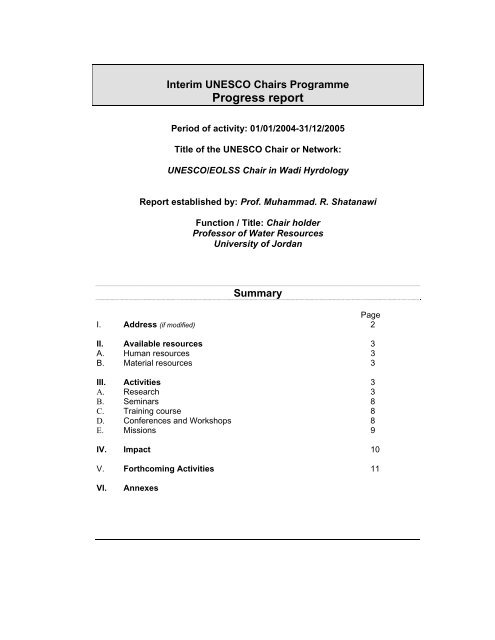
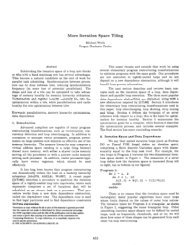
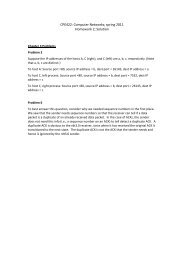
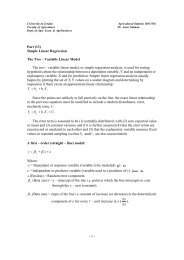
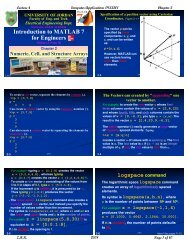
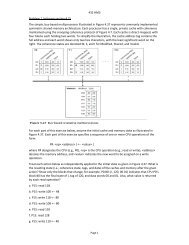


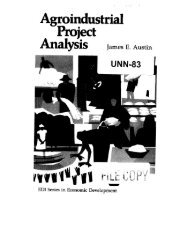
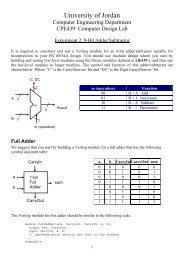
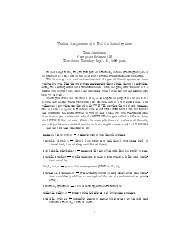

![Problem 1: Loop Unrolling [18 points] In this problem, we will use the ...](https://img.yumpu.com/36629594/1/184x260/problem-1-loop-unrolling-18-points-in-this-problem-we-will-use-the-.jpg?quality=85)
